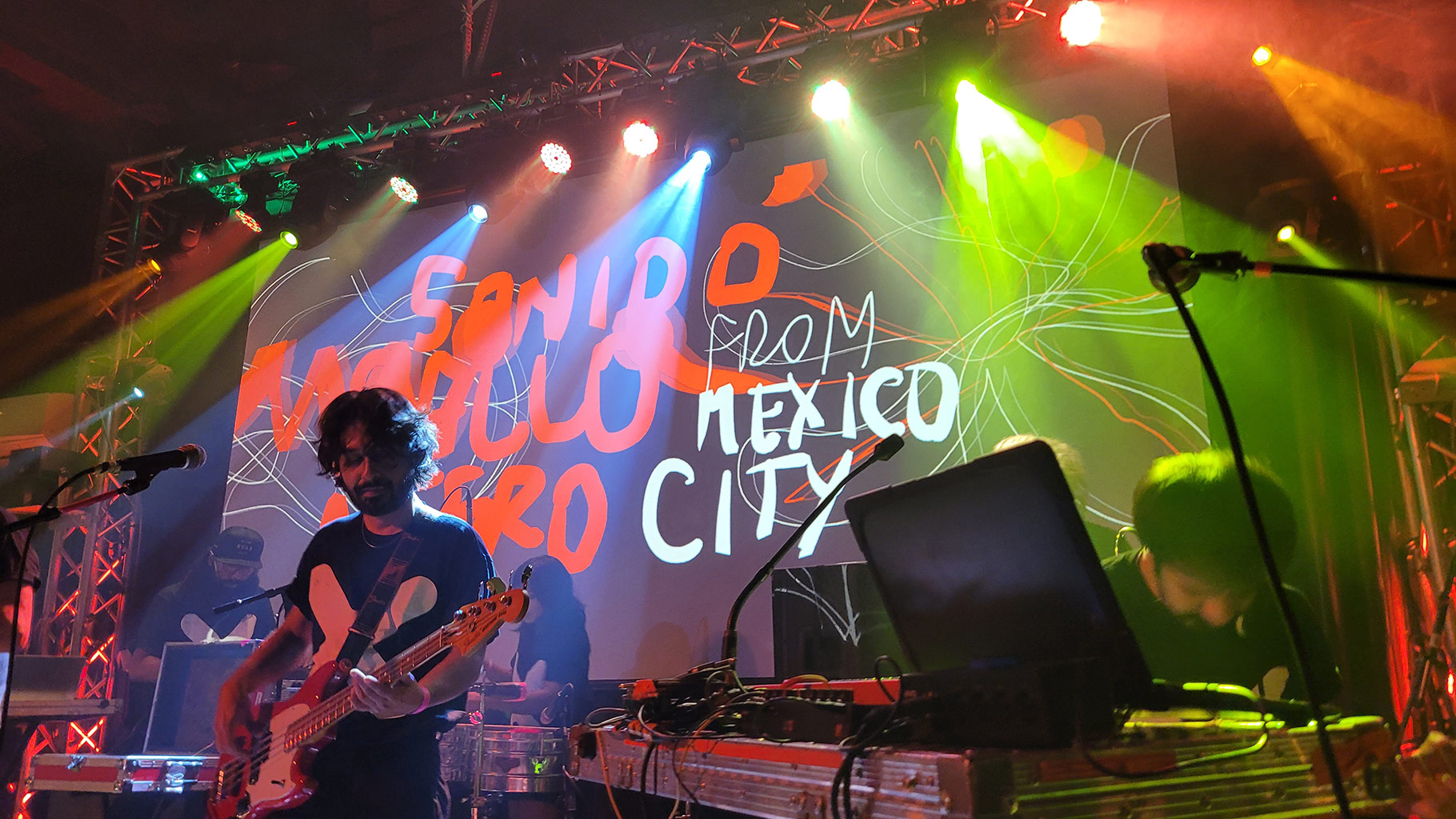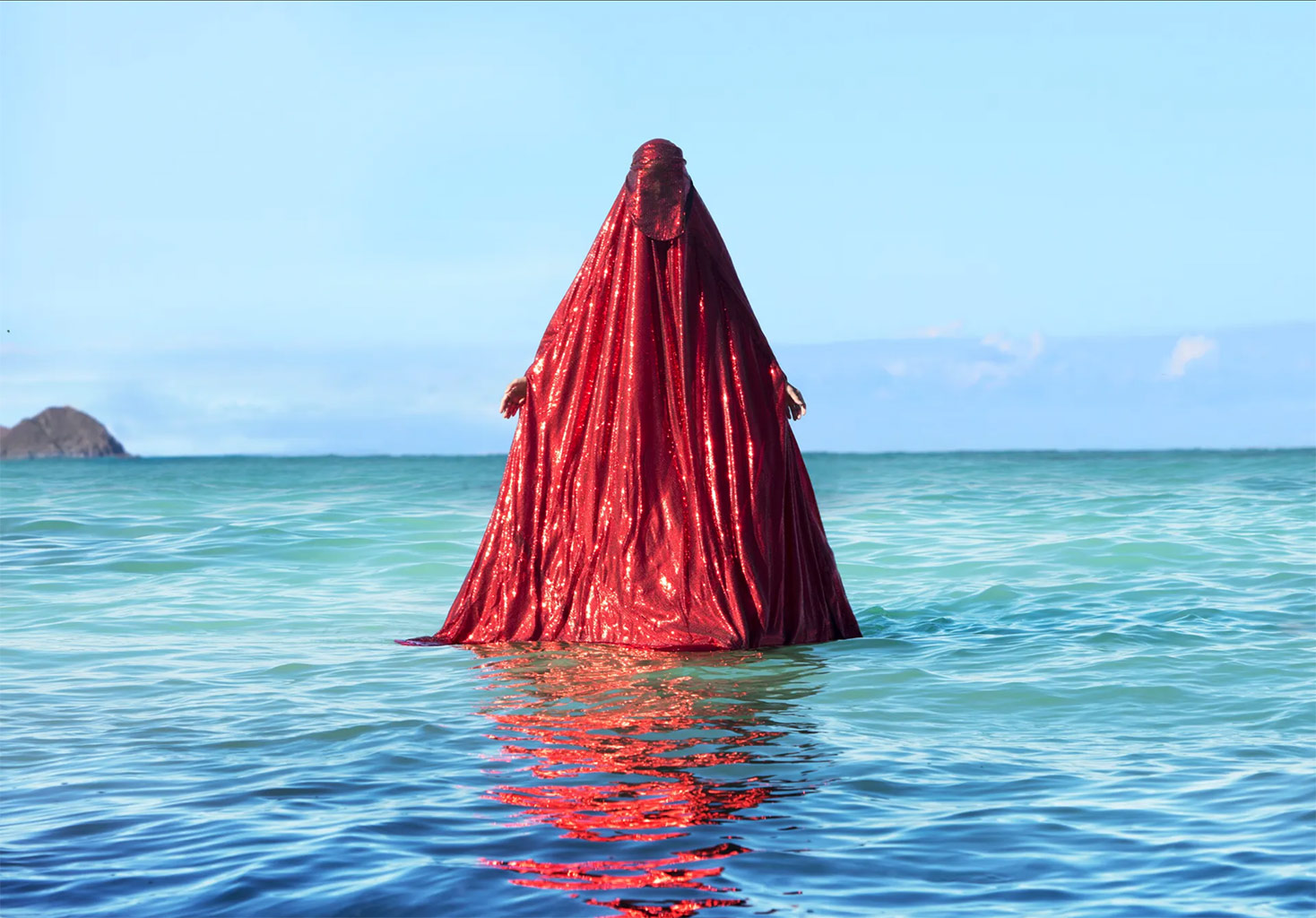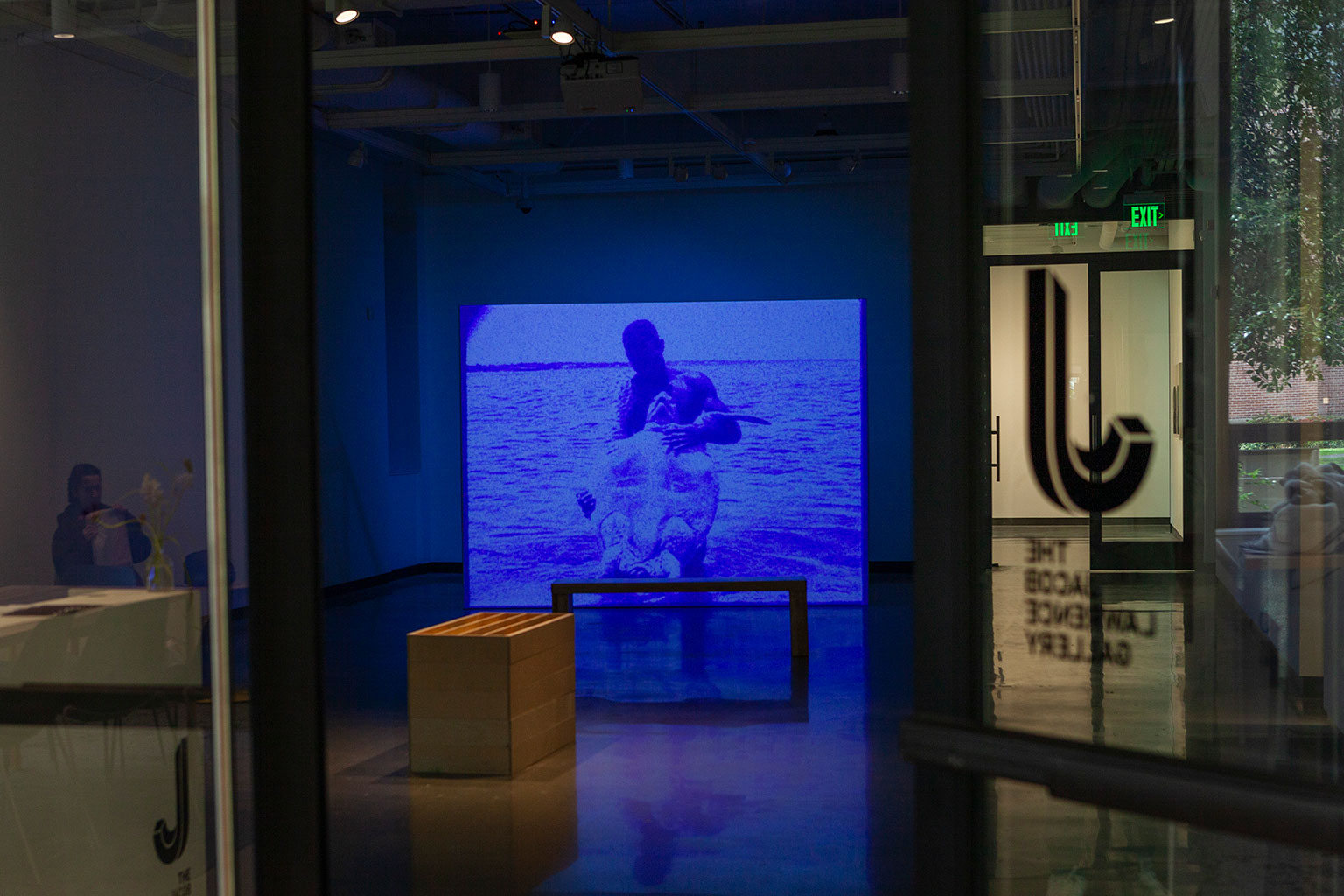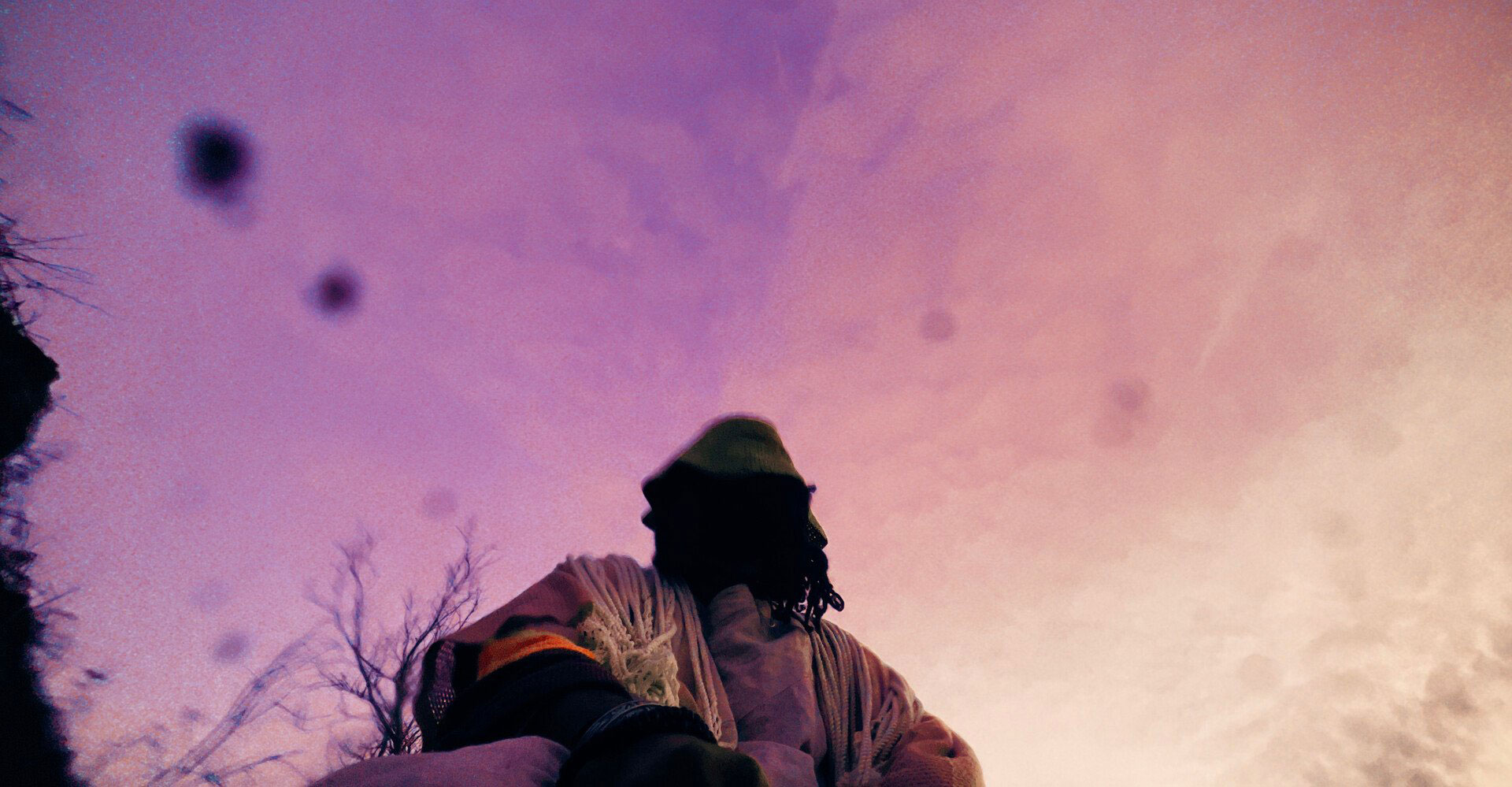 Can you guys introduce yourselves?
Can you guys introduce yourselves?
Kacy Ritter: We are Death Is Not A Joyride. from Austin, Texas. I am Kacy; I am vocals and keyboard, and sometimes I am harp.
Andrew Noble: I am Andrew. I play viola and mandolin, and I talk sometimes, too.
Joseph Salazar: I’m Joseph. I play bass and keyboards.
Ritter: And elephant?
Salazar: And elephant.
John Gouda: I’m John; I play drums and glockenspiel. We’re missing our guitarist.
Noble: Lionel Gonzalez failed to attend today.
FAIL.
Ritter: Our gorilla friend isn’t here today. It’s very sad.
Gouda: Emphasis on fail.
Where does your name come from?
Gouda: It’s like the punchline of a joke we used to tell amongst ourselves.
Now, you must tell the joke.
Gouda: It’s a very, very complicated joke.
Ritter: It’s from Rosencrantz and Guildenstern, apparently.
Gouda: It’s very, very complicated… but the punchline is Death Is Not A Joyride. We thought that it made a pretty good band name.
Ritter: And they had it when the rest of us joined, and we kind of followed suit.
Gouda: It started with me and Joe kinda jamming together, and then we got Kacy and she knew Lionel back from Houston, and then we just kind of found Andrew.
So how long have you guys been together?
Ritter: Almost four years now?
Gouda: Yup.
Noble: Four years.
Gouda: We played our first show about three years ago.
Ritter: Yup! Actually, I looked online, and we’ve played 67 shows together, guys.
How many discs do you guys have?
Noble: We have three recordings. A demo, an EP, and an album. The demo’s called Seeds. The EP is called Crescent Gardens… it’s two tracks, so it’s just barely an EP.
Ritter: And then the album, which is the Human Zoo, which is where we are currently conceptually involved.
Can you tell me about the concept behind it, other than the obvious?
Ritter: I just remember one time, “Remember the Human Zoo,” just sort of really thinking about how much it is similar to be a human in your life… your cubicle is your cage, your car, these things that you have. How we are animals, and how animals are like us. We’re just making the comparison and bringing people to the circus, because we like that.
Did you guys have this theatrical, conceptual approach before this album?
Gouda: Oh, definitely. It maybe necessarily wasn’t as focused beforehand, but it even the Human Zoo builds on it… Crescent Garden is like a location, and Human Zoo is this giant expansion.
Ritter: There’s definitely continuity between the albums and sort of where we’ll go next will also be a new place or sort of museum or time for you to experience.
Are you ever surprised by your fanbase given your aesthetic, or is it pretty much what you’d expect?
Gouda: we expect more from them.
Ritter: It’s interesting because in some ways they’re what you’d expect, but on the other hand, I think we appeal to people who are more like musicians themselves.
Noble: I think we appeal to anybody who want to get outside of the box when they go see a rock show and they want to see something interesting — something they haven’t seen before. So really, there’s a lot of people we are attempting to appeal to.
Ritter: At the same time, there are a lot of people we really don’t care about!
Gouda: No!
Ritter: Hey, it’s totally true! It’s not like we’re going to make music for the masses. We’re aware of that fact.
Noble: That’s true.
Ritter: We’re aware that we’re naturally going to polarize some people…
Noble: And we already have…
Ritter: And that’s totally fine.
Gouda: It’s just that we make music for ourselves, and anyone who wants to join, can.
Ritter: Above all, we’re artists. It’s about the craft and doing something different, not necessarily doing what’s expected.
Noble: Let’s just say we didn’t go in with any real expectation for our fanbase. We figured our audience would be small, probably, but they would find us, and, you know, you’re helping, so thank you!
Ritter: We would find them, and then we would be weirdos together.
Gouda: It is really fun to see some of the people who are fans and they’re also musicians doing their own thing and are unique. People who are fans and are musicians aren’t trying to sound like us. They sound like themselves, because there’s a mutual respect usually, especially with musicians.
Ritter: I also think there’s an appeal to visual artists, too. I myself am about to graduate with a degree in Performing Arts from UT. I think we definitely appeal to anyone who is into visual things as well, because that’s a huge part of what we do.
What is your songwriting process like?
Noble: Tumultuous.
Ritter: Yeah, definitely.
Gouda: Five people locked in a room for four months.
Ritter: There’s no main songwriter in our group, which makes things really interesting. Everyone just kind of puts things together, which is why I think we end up with such a strange mixture of sounds, sometimes.
Noble: And we all pretty much, with a majority vote, can kill an idea.
Ritter: Exactly, since there usually are five of us.
Ritter: And it’s a lot of in studio stuff, a lot of sitting at the computer and playing out different ideas and different sounds, and then arguing about them.
Gouda: When it comes to the band, everyone in the band is an individual songwriter on [his or her] own, or can be, and everyone in the band has a real diverse tastes.
Ritter: Yeah, we all like different things, and certain things cross over.
Gouda: But as diverse as our individual tastes are, it’s really fun to see how little overlap there is sometimes. So it’s just like an encyclopedia of music.
Noble: For example, Joseph is an herbivore, and I am a carnivore. See how diverse our current tastes are?
Ritter: But you live together, in harmony.
Noble: In harmony. It’s like this weird family circus of writing music. It’s beautiful.
Gouda: I don’t know. I always just think of the band as five composers, and each record that we do is like a different composition… sort of like a bastardized symphony. But you get like five composers, with like twelve instruments, trying to arrange them into…
Ritter: Different movements…
Gouda: Yeah, a musical concept as a whole… that’s what I like about the records; they usually have a whole, organized, cohesiveness about them.
Noble: It’s more like bastardized opera, with the concept and the lyrics. It’s basically what we made with our album. It’s a rock opera, I suppose it could be understood as, although it’s not a narrative necessarily…
Ritter: It’s more thematically involved.
Noble: It’s more like a mind map. Of themes. But I think that’s kind of part of the deal, too. We want themes — visually, musically, and then dramatically in our music, and in our whole presentation that unify into a Gesampt-kunstwerk.
Ritter: It means “total artwork”… it’s something that Wagner talked about.
What are some of your individual influences?
Noble: I’m a classically trained violist, and I also play violin and mandolin. I taught myself guitar about the same time I started learning how to play violin — or viola, rather — I’ve always been a violist. And I have two music degrees. One from here at UT Austin. My background is mainly classical, and of course just like, being a white kid in the suburbs and hearing all the classic rock and straight-ahead rock — the same type of music my father was into and had an extensive record collection that I listened to. And then, specifically with classical music, I liked modern classical music of the 20th century… I mean, I like all of it, but I’m particularly interested in where we’ve been recently.
Ritter: I was in choir for like, twelve years when I was younger, and I eventually realized there was something about choir that I just couldn’t deal with. There were a lot of political and religious influences, so I kind of left that and started to become a visual artist. Went to school for two years to be a creative writer and realized that what I was really, really interested in was performance art. So, for me, I work on a lot of visual stuff; I make the masks and stuff. So even though I am a vocalist, I feel like a lot of my contributions are .
Salazar: I guess as far as my musical background goes, I’ve just been around it most of my life. My parents were really into music. I started picking up guitar and piano when I was really young, and just started playing in bands, basically as soon as I could find one that I could get into. Yeah, I started playing with John pretty early… he was in the first band that I was in; we played together. We played with several different people, and it kind of became Death Is Not A Joyride. Yeah, that’s pretty much it, I guess.
Gouda: I grew up in Austin, so I guess I’ve been surrounded by music my whole life. I remember shows at Liberty Lunch and Black Hat stuff… I remember my sister got me kinda into Fugazi when I was a kid and I got a pipe drum when I was thirteen. When I was eighteen, I joined my first real band with Joe here and just have been playing in clubs with various different bands since then. I got into the glockenspiel in ’03…
Ritter: The glockenspiel, man!
Gouda: I didn’t interrupt you guys!
Noble: Sorry. I was feeling that one, too.
Gouda: I don’t know. And that’s just kind of it for me.
Who wants to speak for your missing human… animal?
Ritter: I will. The gorilla — actually, Lionel and I actually went to high school together and were in a band together and eventually just came and moved to Austin. He just taught himself to play guitar by sitting around and copying other people that he listened to like Tool and Nine Inch Nails, asking, “How do you play these things? Okay, now I understand.”
Noble: He has no language for music, either.
Ritter: Yeah, that’s one of the interesting things.
Noble: It’s one of the most frustrating things.
Ritter: It’s frustrating, but there’s something about the way that Lionel plays guitar that…
Gouda: He’s a really intuitive player.
Ritter: Yeah, definitely. It’s very hard to talk, though. We don’t always speak the same language all the time.
Salazar: There is a balance, because sometimes when I feel like I learn certain things about music, when I sit down, I immediately want to play it that way, and sometimes it’s nice to have a more outside approach.
Noble: And that always happens with four other entities working on music.
Gouda: And it also works really well, I think, cause, in pairs, a couple of us have been playing for several years. I’ve been in a band with Joe since I was eighteen. It’s been like eight years. Same thing with Kacy.
Ritter: Yeah, Lionel and I have been playing together for like eight years or something. Seven years. Wow.
Gouda: We can just read each other really well despite being a young band with different musical approaches.
You guys get a lot of attention in Austin. Have you gotten much of a fanbase elsewhere?
Ritter: I have to say the power of the internet… Austin has been our best press so far, but we do get lots of people that pay attention to us.
Salazar: We received favorable feedback from a lot of other places.
Ritter: From like Spain, and Scotland, and…
Salazar: Yeah, even outside of the country, we’ll have people buying our albums online.
Gouda: France, yeah, we have like little pockets.
Ritter: Yeah, France. And there’s a lot of people who will contact us through MySpace who are like from Germany. I feel like people in Germany really like us.
Salazar: It’s really tough, because with how hard it is for a band to go on tour, it took to reinforce that, and I think a lot of bands nowadays are sold on their live show. I was talking about Monotonix earlier. That word just starts spreading, and it becomes a really big deal; everybody has to go see that show. It’s just very hard to tour.
Ritter: I think it’s really difficult for us, too, because the live show is such an important part of what to do, and to give someone an album and be like, “Here, this is Death Is Not A Joyride.” I don’t know. It’s not the whole picture. I wish that we could go play shows in lots of crazy places… I feel like our response from our live show is quite good.
Noble: I think we just haven’t had enough exposure for obvious reasons.
What obvious reasons?
Ritter: Like, we suck!!
Gouda: Nah, it’s just like the limitations of an album are so…
Noble: I think that’s a separate issue.
Gouda: Well, I don’t know. If the album is what your band was, if you were some of these pop bands that only do albums, you could send your album out to places you can’t go, because your album is you.
Ritter: Yeah, I think we’re definitely involved in creating an experience with people.
Noble: I think if you love the album, you’re going to love the live show.
Gouda: Even if you don’t like the album…
Ritter: But there are people who might not like the album but really think that the live show is a blast.
Do you find it difficult to find bands to tour or play shows with?
Gouda: At first it was hard to find bands to play with, but over time, we’ve found bands that all kind of exist in the same meta-world.
Ritter: Yeah, people who are just trying to do things that are diverse or sort of experimental.
Salazar: A lot of bands that we play with, especially on a smaller scale, are not trying to do the same thing, and it’s kind of nice, because it kind of creates a diverse show. I think it’s okay because we’re all friends and we all have similar friends, and we all appreciate each other’s music.
Gouda: I don’t think any of us would have wanted to be in a scene where every band sounds alike. It’s just fun to be like, we have this and this and this.
Ritter: I find that a lot of times when we do find bands to play with, sometimes musically, there’s not too much related at all, other than the fact that they’re maybe using miscelleous instruments, or synthesizers… not necessarily that there’s exactly a lot of avant-whatever-we-are bands walking around.
Noble: Bands like Invicible Czars from Austin… we plan on doing some stuff with them this summer.
Is Seattle on your stop list?
Gouda: We wish. We really want to.
Ritter: I really wish. I definitely want to go up west.
Noble: Yeah, we need to tour again guys.
Ritter: Yeah, let’s go on tour! Let’s do it right now!
Gouda: Gas prices are going to rise, soon. We should do it soon.
Noble: Tomorrow! We’ll just call ahead.
Anything else you guys want to add?
Ritter: Not particularly.
Ritter: Welcome to The Human Zoo.
Salazar: We have a MySpace account.
Noble: Thank you SxSW ’09.
Gouda: Thanks all the fans and everybody.
Ritter: One more thing I want to say, just a short thing that’s pretty cool… We all sort of met each other through the Austin Chronicle which is a publication from here. We just got an award from the Chronicle for being best experimental band. That was cool. There was something that felt very good. And the band we played our very first show with, Subnatural, won best goth/industrial band.
Gouda: And One-Eyed Doll, who we played one of our first shows with. In ’06, it was us and a couple of these other bands playing in these clubs because we felt kind of like the misfits, and now it feels a little bit good to know that…
Ritter: A little bit of validation! We’re artists! We love validation!
Noble: Yeah, we have Susanna Chapelle and my friend Roberto from the Tosh, so people need to check out the music pool, because I think it really reflects the heart of Austin music right now, because all those bands are cool.
Gouda: Yeah, this was a good year.
Noble: The only say it doesn’t really reflect is the folk scene here, like Some Say Leland, or Dana Falconberry. There’s some cool, weird new folk coming out of Austin, too. And I guess I’ll go ahead and plug my other band, too, Infinite Partials, which is in that scene too… an all string band that is kind of changing what a string band is. Austin experimental has quite a wide range…
Ritter: Gotta love Austin for having so many bands, and you gotta hate Austin for having so many bands.
Gouda: Oh no, it’s the best thing. Red River [St.] is like a sound collage most nights, and it’s the funnest thing to walk from 9th to 6th and hear so many different styles hit at you.
I was talking with a band I’d previously interviewed about these bars. How often are those streets like that? How can they possibly sustain themselves on a regular basis?
Noble: 60,000 college students!
Ritter: That’s true.
Noble: You do the math!
Ritter: And that’s just at [University of Texas].
Noble: Austin is one of the most drinking towns in the country. Seriously. It’s in the polls.
Gouda: But in all more subtleties… the music thing… it’s not as crowded [as SxSW] most weeks of the year. This is a special week.
Ritter: I think that the thing you have to keep in mind, too, is that since there are so many artists… artists in many ways support the clubs, and clubs support the artists, because artists do self-promotion, they want to get their friends out, they want to get new friends out… we sell their beer, and they in turn sell us. When some cool band comes through, they ask, “Hey, do you guys want to play with Voltaire or Sleepytime Gorilla Museum?” and we say, “Yes!” I think that it’s a huge mutual thing, and then the fact that the city is just so involved with musicians and music, because it’s the “Live Music Capital of the World!”
Noble: “Free Guitar Lesson Capital of the World.”
Ritter: Yeah, every single person you talk to is in a band.
Noble: We work all day, we play all night, and we party all weekend. That’s how we sell all the beer. Because that’s a stressful lifestyle. Hey, you gotta drink it off every once in a while. Anyways, “The Truth About Alcoholism In Austin, Texas, by Death Is Not A Joyride.” — is that what you’re going to call the article?
Yes. Thank you for doing the legwork for us.
END.






